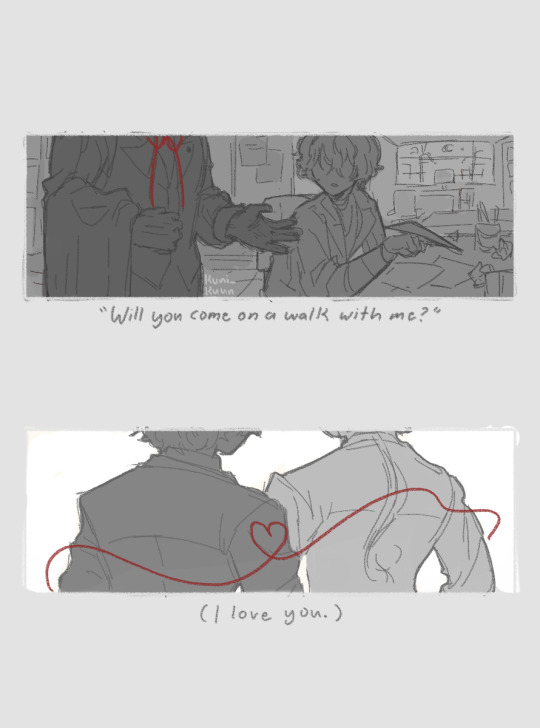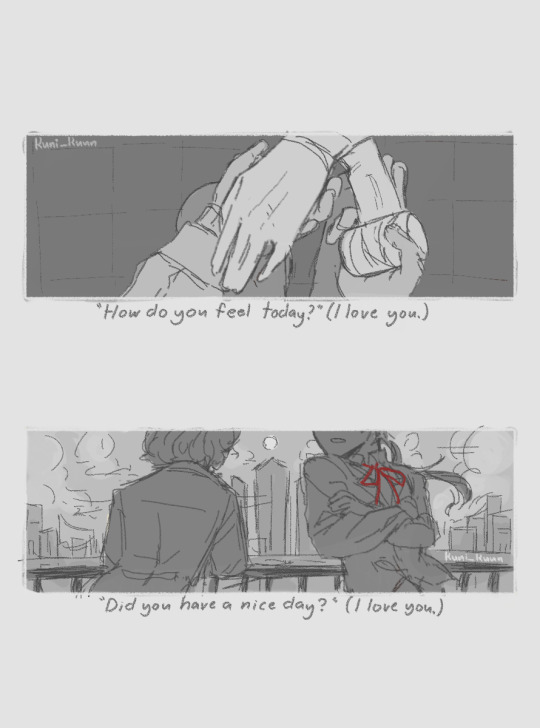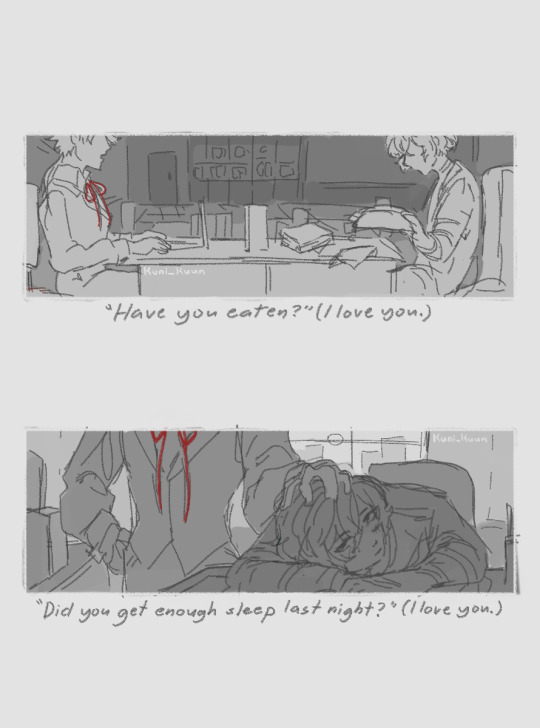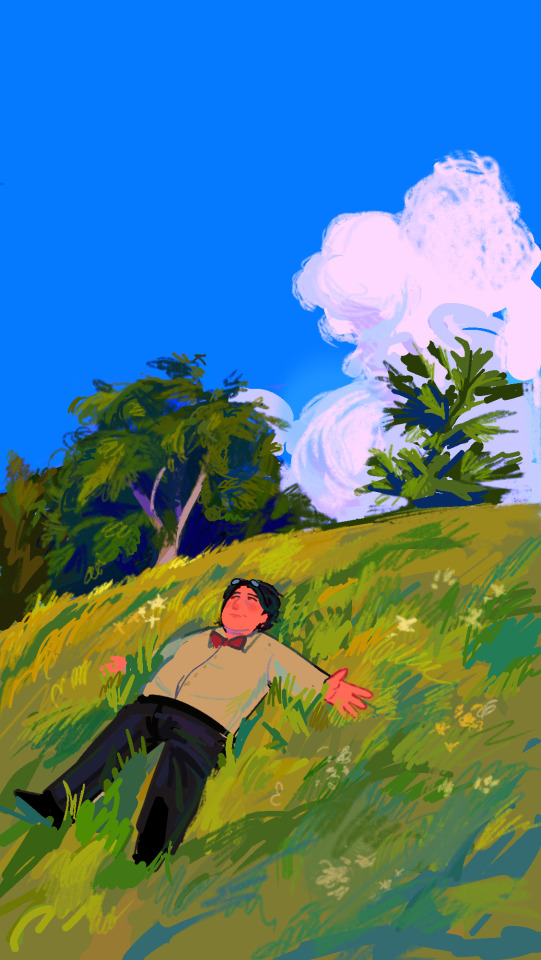Text
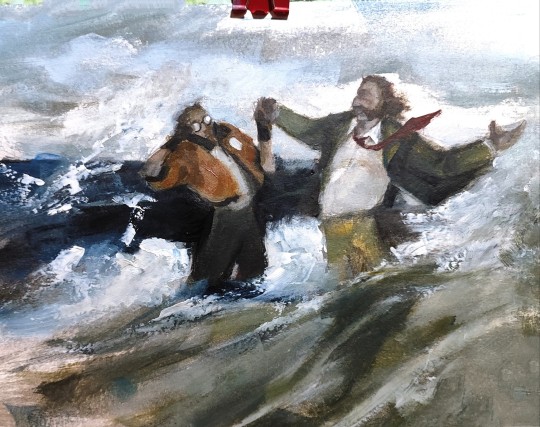
I.E. Repin “What space!”
(but this is my fan art for Disco Elysium)
2K notes
·
View notes
Text

The End of All Things by Maximilian Pirner (1853 - 1924)
5K notes
·
View notes
Text
the morning after i killed myself, i woke up.
the morning after i killed myself, i fell in love.
i fell in love with my mother and the way she sat on the floor of the room next to mine with her wrinkled prayer books in her palms.
i fell in love with my father who had just come home from work at night and kissed me while i was pretending to be fast asleep.
i fell in love with my brothers who once took me to the beach on holiday but they are now back sitting at their desks at work and school trying desperately to believe i still existed.
the morning after i killed myself, i gave my cats their foods. i watched the way their tails twitched when they heard my footsteps.
the morning after i killed myself, i went back to see my friend's old house where i left my footprints there and examined how they were already rotten and destroyed.
the morning after i killed myself, i watched the sun come up. each flower opened like a hand and the kid down the street pointed out single blue cloud to his mother.
the morning after i killed myself, i went back to that body in the morgue and tried to talk some sense into her.
i told her about the prayer room at her house, the kiss, and her parents.
i told her about the sky and the beach and her cats.
the morning after i killed myself, i tried to unkill myself but i couldn’t finish what i started.
0 notes
Text
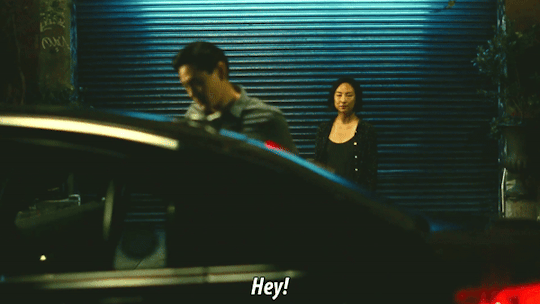

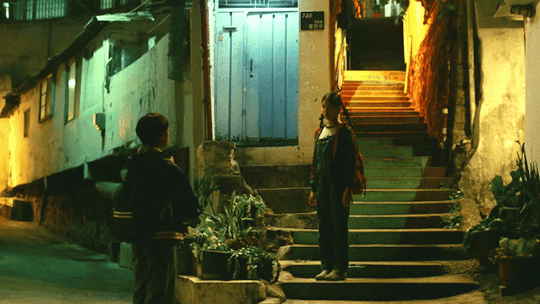

Screenplay written by Celine Song
Past Lives (2023) dir. Celine Song

2K notes
·
View notes
Text
“Please, please be gentle with her,” the smallest little girl she had ever seen knelt in front of her. She didn’t cry, but didn’t stop begging on her knees. It almost looked like she was worshiping her.
Her small body looks abnormal compared to the woman she was talking to, way too small, too short, and too skinny. The only thought that crossed her mind was to guess that it seemed like the ugly and horrific thing that had happened to her had almost sucked her body alive. Slowly, but it was quite clear that she was continuing to shrink as if her life was eating her alive.
“She’s a human with feelings, she’s a human too..,” continued the little girl, repeatedly. “So please, please, please be gentle with me. You’re a human too.”
The woman’s life flashed before her eyes, she knew the little girl.
“I’m a human.. too,” she said, sounding almost like she was convincing herself.
Only a long, long hollow silence followed after that.
0 notes
Text
“kamu ini… murah senyum, ya?”
sebelas tahun setelah seseorang mengatakan itu, masih teringat jelas suaranya.
padahal, orangtua sendiri saja selalu mengatakan saya terlalu cuek dengan orang lain.
jadi, mana yang benar? saya tidak tahu.
tidak pernah benar-benar tahu.
hidup saya ini, selalu dibayang-bayangi dengan perkataan orang lain. sialnya, saya selalu mendengarkan mereka.
“kedepannya, mau seperti apa?”, mana saya tahu.
berhasil menginjak umur yang sekarang saja, rasanya campur aduk.
saya ini tidak pernah berpikir dapat hidup lama.
“ah, paling juga selesai di umur tujuh belas tahun”
“masih juga. mungkin di umur dua puluh satu?”
selalu saja begitu. sampai detik ini pun masih berpikir, “di bulan apa ya kira-kira?”
pertanyaan-pertanyaan itu, selalu ada dalam diri saya.
ajaibnya, saya selalu berhasil untuk tidak mendengarkan perkataan jahat yang keluar dari pikiran sendiri.
nahasnya, saya jadi selalu berkeinginan untuk mengakhiri.
sumpah, rasa sayang saya kepada orang-orang yang saya kasihi begitu besar.
sekalipun tidak ada lagi komunikasi, nama mereka tetap ada dalam doa (saya tidak religius, tapi ini saya berani bersumpah)
maka jika disimpulkan ini bukan cerita mengenai perang antar sesama manusia, melainkan perang dengan diri sendiri.
“lalu, mau bagaimana?”, kali ini saya tahu jawabannya.
namun, terlalu jahat dan egois untuk diucapkan.
ntahlah.
semoga selalu diberi keselamatan dan ketenangan bagi jiwa-jiwa yang menderita.
1 note
·
View note
Text
ah, akhirnya.
sejujurnya, saya hampir lupa bagaimana caranya menulis. menuangkan apa yang ada di dalam pikiran.
rasanya hanya, berantakan.
nyatanya menjadi orang yang suka kerapihan, cukup menyedihkan. hidup saja bahkan sangat jauh dari kata “rapih”.
saya ini, sakit.
sakit berkepanjangan. bukan, bukannya diderita penyakit-penyakit mengerikan yang ada di dunia ini.
bukan.
tapi rasanya sakit, sakit sekali.
“dimana letak rasa sakitnya?”, saya tahu persis dimana. di dalam diri saya, disitu lah sumber rasa sakitnya.
“memang apa yang dirasakan?”, rasanya seperti ada lubang besar di dalam tubuh. lubang itu terus menyerap diri saya. perih rasanya.
tapi tidak apa-apa, sejak kecil sudah begini.
hampir setiap malam waktu habis hanya untuk menangis. kalau diingat-ingat, cukup mengerikan.
menangis secara diam-diam.
“jangan sampai ketahuan siapa-siapa, ya?”, ucap hati memperingati diri sendiri.
menangis. menangis. menangis. terus menangis. kasihan.
jadilah saya anak yang pandai dan handal mengumpati tangisan saya.
kepada anak itu, saya ingin meminta maaf.
maaf, ya? sampai detik ini pun, malam masih jadi waktumu yang benar benar hidup.
mungkin memang bukan disini tempatmu.
0 notes
Text
I'm reading No Longer Human, and its taking me ages because im having to take days in between each time i read. I'll read a maybe 5-10 pages at a time then have a break because of how close to home it gets. Its so hard to read because i can see myself in the protagonist and its upsetting and uncomfortable. The fact that its considered semi-autobiographical and some consider it Dazai's suicide note makes it even harder, because i cant just think of it as fiction.
I definitely recommend it but its not for everyone, and people should look up trigger warnings first.
13 notes
·
View notes
Text
"whenever i was asked what i wanted my first impulse was to answer 'nothing.' the thought went through my mind that it didn't make a difference, that nothing was going to make me happy."
- Osamu Dazai, 人間失格 (No Longer Human)
235 notes
·
View notes
Text
Japanese author Osamu Dazai giving a lecture at Tokyo University of Commerce (the predecessor of the current Hitotsubashi University) entitled 'Modern Diseases' on October 2 1940.
Fun Fact: Dazai was nervous and sweaty on this day, his friends recalled him being extremely nervous, wiping his forehead with a handkerchief.
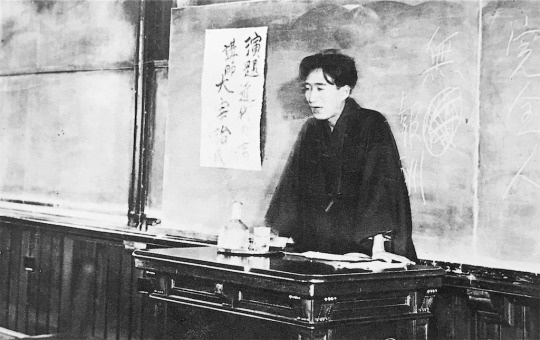
The lecture was a success though, and his popularity grew among the students with many of them starting to enthusiastically read his work.
243 notes
·
View notes
Text
“You are very foolish." Mother's voice as she spoke these words was shaking with anger.
I lifted my head. "Yes, I am. I've been taken advantage of because I'm a fool. You're getting rid of me because I'm a fool. It's best I go, isn’t it? Poverty - what's that? Money - what's that? I don't understand such things. I had always believed in love, in my mother's love, in that at least."
~ The Setting Sun, Osamu Dazai
161 notes
·
View notes
Text
Why should you read Japanese literature? And from there can learn from it.
"After all, what can we ever gain in forever looking back in time and blaming ourselves if our lives have not turned out quite as we might have wished?"
This a quote from Kazuo Ishiguro's work, 'The Remains of the Day' captures the repercussions of ideas in which a man built his life with.
Japanese literature has been on the rise in recent years with the existence youth favourite writer, Haruki Murakami, along with the sudden viral surge of Nobel Prize in Literature 2017 winner, Kazuo Ishiguro. Thus, the question “Why does the world, especially the new generation should read the Japanese literatures pop up?” alongside the rise of the authors.
In the works of Japanese authors, I find this sense of warmth within them, even when the plots are dark and filled with thrillers. The quote above is amongst one of the many examples of the sense of warmth mentioned, where in the book Ishiguro explored the life of Stevens, a long-serving butler of Darlington Hall. He embarked on a leisurely holiday that will take him deep into the countryside, at which made him reflect on his own past. In the face of evolving Britain, Stevens question whether his dignity and properness have come at a greater cost to himself. In the book it felt like Ishiguro brings about a hidden emotion within a reader that has always been connecting him or herself with the reality of the world that they more often tend to forget in the midst of this fast-paced and busy world.
The Nobel Prize organisation described Ishiguro as a writer “who, in novels of great emotional force, has uncovered the abyss beneath our illusory sense of connection with the world.”, when he won the Nobel Prize in Literature 2017. For me, reading the book brought me to place, somewhere far away, by the seaside or under the night sky, where I sat down and got caught in the moment reflecting myself as a person and the choices I made. In the end, we as humans, are always connected to the choices we made, be it either it’s about how we live our lives or things that we want.
Now we move on to the most well-known Japanese author, Haruki Murakami. Since the day I have been involved in reading, I had encountered both, people who like and don’t like Murakami as a writer. Most of the latter party had affiliated their dislike in regard to couple of the prominent characteristics of Murakami’s work, which is sense of darkness and eerie that are attached to bits and pieces of his writings. But what if I say, with that darkness, there are much more important stuffs that are relevant to us humans. Quoting Murakami’s ‘Kafka on the Shore’,
“Sometimes fate is like a small sandstorm that keeps changing direction. You change direction, but the sandstorm chases you. You turn again, but the storm adjusts. Over and over, you play this out, like some ominous dance with death just before dawn. Why? Because this something isn’t something that has nothing to do with you. This storm is you, something inside you. So, all you can do is give in to it, step right inside the storm, closing your eyes and plugging up your ears so the sand doesn’t get in, and walk through it step by step.”
Murakami brings reader to a realm where they bend their imagination around the whimsical characters and their sandstorms plotted by the author himself. Murakami redirects reality by intertwining the existence of his respective novel protagonist with a place that transcend logics and reasons. This concept of writing, which people call ‘Magical Realism’, makes his protagonist not able to understand what’s happening to them as things are often not what they seem to be. This style writing is what would intrigue readers because they are recognizable if not always relatable to us as humans living our lives, where in Norwegian Wood, Murakami brings about the sense of death, loss and grieve, while in Kafka on the Shore, it surrounds the journey of self-discovery in which each of us would at the very least once go through in our life.
All the above in Japanese literature, be it concepts or style of writings, are being brought to the readers often if not always, in metaphorical ways which readers would always find themselves baffled every time they thought they figured out what is happening in the world of the respective books they are reading. Japanese authors more often succeed in bleeding fiction into reality. All those fictions are written in such ways that their words are articulated so that supernatural possibilities, individual thoughts, and imagination then seems to actually be reality of the world. Even when those imaginations are traumatic, dark and eerie, they made us, as humans, acknowledge those fictions aren’t only fictions but also part of the world’s reality.
And before I hit the sack with this post, let me close this posting with heart-rendering quote by Toshikazu Kawaguchi in his own 'Before the Coffee gets cold', where he explores 'the meaning of time' in his writings, so that you could also be left in awe, wonder and curiousness in my attempt to lure you into reading Japanese literature:
“There is no greater suffering than that of a parent who is unable to save their own child who wants to die.”
299 notes
·
View notes
Text
Maturing is realising that all these characters people hate for being unlikaleable are amazing because they're so well written and realistic that it makes readers feel called out
82 notes
·
View notes
Text
It is almost impossible for me to converse with other people. What should I talk about, how should I say it? - I don’t know.
Osamu Dazai, from No Longer Human, 1948
268 notes
·
View notes
Text
"As long as I can make them laugh, it doesn't matter how, I'll be alright. If I succeed in that, human beings probably won't mind it too much if I remain outside their lives. The one thing I must avoid is becoming offensive in their eyes: I shall be nothing, the wind, the sky."
— osamu dazai, no longer human
663 notes
·
View notes
